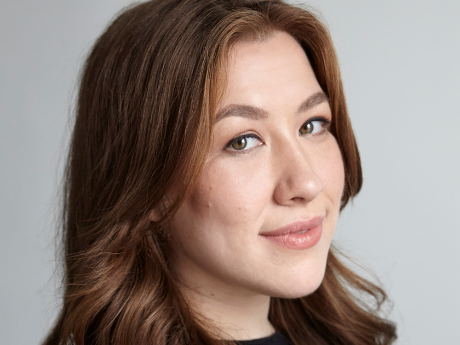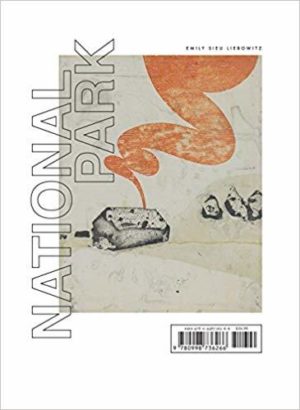In Their Own Words
Emily Sieu Liebowitz on “I Am Always Leaving to Gather the News”

I Am Always Leaving to Gather the News
I sit there, I go away, I let pavement push
against. Epicenter converses shifting. 1906 loops
translation from universally understood spatial
signifiers, tremors card games from a competitive
streak. Documentation spokes plaintive
thoughts through aggregate arrivals. A wafted neighborhood
arranged into a fleeting horizon. Bills are resource,
design axioms our limbs clean. I hand
wash my clothes because machines clamor:
down coat, wool scarf, conventional glove wearing
weather. I am tired of this. I take public transportation.
The tacked down rush-off of the crowd detonates—
It screams, "goodbye radio, goodbye wave/particle confusion,"
We are ready—paradigm,
I have provided California, and I am losing my balance,
lesser phenomena drowning my eyes to a tear.
Expansion of dryland farming is an effigy of my year.
Taken space enlarges nothing, a tacked down
itemized account of Fort Kearny's informational center.
Camping on each landing comes with its own national
anthem, a staircase humming, "goodbye continents,
goodbye immaculate overthrow." We've been carried
along in motion, herded into direction, given
brochures along the way. I deserve better than this: a window
unwinding, fending off a constant apology, born too late
to mobilize, dismantling basic feature.
Highway infrastructure traverses dead weight,
the Portola Expedition, mailbox grouping. Things we have
in common converses boring like, "goodbye protoplasmic
centuries, goodbye radiating land run incentives."
This sentimental farewell is a centrifuge finishing school,
a miniature 2010 census envelope.
A moment magnitude parades my home full of houseplants.
I don't do anything.
They just grow.
From National Park (Gramma Poetry, 2018). All rights reserved. Reprinted with the permission of the author.
On "I Am Always Leaving to Gather the News"
The title is taken from an Andre Breton poem, and I've sat with that line for a long time. The poem is in some ways a response to that line, an examination of the individual and the collective, and how events, lives, and people turn into news, history, and narrative.
I wrote this poem before the era of "fake news," but it feels more on point today then when I wrote it. I was thinking about how the past was built, then used that idea to construct a more routine everyday experience. The poem balances that sense of an oversimplified and broad everyday world: "I sit there, I go away" to a specific, but abstract act; "I let pavement push against." These are the forces that the individual speaker must simultaneously confront and accept in one action.
In a lot of ways, the poem excavates and estranges history throughout, hoping to eradicate the seamlessness with which many of us have started to digest information, without any critical thinking, at the moment we take on an idea that we then use as the basis for other decisions and our identities. This is a thread found throughout National Park. But when I wrote this piece, I was living far away from home, or a sense of home, which compelled me to look especially for historic markers of place: the place I am from literally and then in a larger sense. When I lived in the middle of the United States, I felt incredibly disconnected from the narrative of American identity there. I thought if I could meld the two—the everyday experience with the roots it carries into song or lyric—I might find a larger collective. I think about how major news stories function in the collective memory, "where I was when JFK was shot" for example...not necessarily the implication of how, why, and when he was shot, but the feeling we all could feel together watching (or referencing watching) the moment we saw something together. That maybe we could take solace in, or make a marker of, that moment—all while sewing and stitching a history or self that is itself a pipe dream.
It all feels much closer to the public situation now, where the news sources warn us to properly parse our information, lest we be taken advantage of by "fake news." Now we all are "going to gather the news," which is the only collective part about "news" that's left, or perhaps was ever even there.



